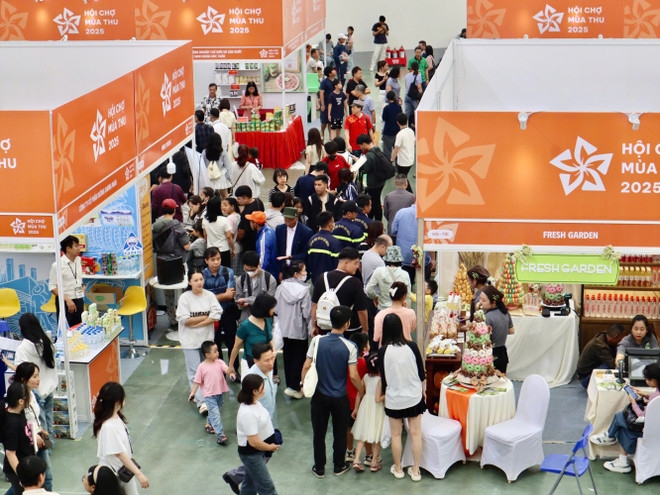Impressive figures
Starting from October 25 at the National Exposition Centre in Hanoi’s Dong Anh commune, the fair pulled in nearly one million visitors, or an average of 100,000 per day, the highest turnout in Vietnam’s trade promotion history.
Co-hosted by the Ministry of Industry and Trade (MoIT), the Ministry of Culture, Sports and Tourism (MoCST) and the Hanoi People’s Committee under the theme “Connecting people with production and business,” the event spanned over 130,000 sq.m with 3,000 booths representing 34 cities and provinces and over 2,500 Vietnamese and foreign enterprises.
It showcased a vast array of industrial, agricultural and cultural products, with foreign exhibitors and partners from Asia, Europe and Oceania hunting for investment and collaboration opportunities.
The MoIT data showed average revenue per standard booth hitting 300 million VND (11.500 USD), while total direct sales exceeding 1 trillion VND. Local booths alone raked in 50 billion VND.
Contracts, transactions, and memoranda of understanding (MoUs) signed on-site were valued at nearly 5 trillion VND, including 500 billion VND from local exhibitors, cementing the fair’s role as a genuine business platform beyond mere display.
    |
 |
|
A view of the Autumn Fair |
The event hosted dozens of forums, workshops and thematic conferences, including international trade sessions with firms from Japan, the Republic of Korea, China, Singapore, New Zealand and the European Union. More than 100 cooperation agreements and MoUs were inked, underscoring Vietnam's rising allure for global investors.
It signaled a pivot to integrated trade promotion, weaving commerce, investment, innovation and digital transformation. Far more than a “shopping festival,” the Autumn Fair emerged as an economic bridge linking Vietnam with the world, showcasing organisational prowess, strategic foresight and domestic business strength.
It delivered on “six bests”: largest scale, most modern venue, richest product diversity, highest quality, most engaging activities and most supportive policies. Thousands of booths fueled trade, tourism and cultural exchanges while projecting the image of Vietnamese people and products.
The event also served as a vital conduit for Vietnamese firms to accelerate global economic integration, share expertise and secure technology transfers, especially in digital transformation, green economy, circular economy, sharing economy and knowledge-based economy
Hub of arts, creative cultures
While the trade zone formed the fair’s “backbone,” its arts, culture, cuisine, and creative zones served as the “heart.” The Vietnamese cultural industry and heritage pavilion featured highlights from cinema, music, fine arts, and traditional crafts.
A dedicated film zone drew thousands daily, with audience interactions involving cast and crew from movies such as “Mua do” (Red Rain), “Tu chien tren khong” (Hijacked), and “Mui pho” (Scent of Pho), bringing Vietnamese cinema closer to the public.
Performing arts displays, from puppetry and circus to tuong (classical drama), cheo (popular opera) and cai luong (reformed opera), ran continuously, courtesy of MoCST theaters, fusing cultural promotion with entertainment.
The culinary area emerged as a crowd magnet, offering hundreds of regional specialties: Hanoi's pho, Hue's spicy beef noodle soup, Thanh Hoa's fermented pork rolls, Buon Ma Thuot coffee and Soc Trang's pia cakes. Each dish doubled as a “cultural ambassador,” delivering a sensory tour of Vietnam's gastronomic diversity.
A standout feat was the Vietnam record for a National Exposition Centre model crafted from 410kg of Vietnamese red sticky rice and 100kg of beans, a creative nod to Vietnamese agricultural pride and culinary craftsmanship.
The event’s communication blitz also set records, with tens of thousands of stories and videos across print, television, and social media, amassing over 100 million online views. Individual livestreams drew 2,000-20,000 viewers.
A particularly moving highlight was the charity campaign “Autumn of Hope – Sharing Love” launched by Prime Minister Pham Minh Chinh at the opening ceremony to support flood-affected communities in central and northern Vietnam. More than 2 billion VND was raised during the fair, with totals expected to rise further at the November 3 closing ceremony.
In a gesture of solidarity, the MoIT proposed scrapping fireworks and music at the closing to honour disaster-affected regions, preserving the event's humanitarian spirit.
Organisers declared the 2025 Autumn Fair a comprehensive success, exceeding all targets and solidifying its role as a national platform for trade, investment and cultural promotion. The fair contributed considerably to domestic market growth, sharpening the competitiveness of Vietnamese enterprises, and elevating the national brand globally.
That success paves the way for the fair to become an annual flagship event showcasing Vietnamese goods, drawing investment and spreading national cultural values worldwide.
Source: VNA